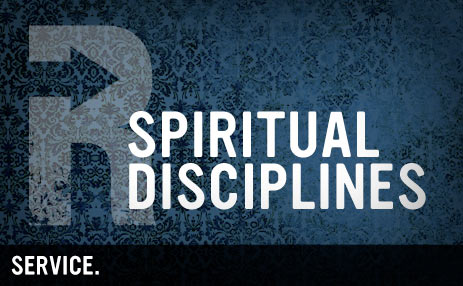Latest
-
Objections to the Christian Faith from the Unchurched and De-Churched
 Tue Dec 02, 2014
Tue Dec 02, 2014
by Resurgence -
Craig Groeschel: We Innovate for Jesus
 Tue Oct 14, 2014
Tue Oct 14, 2014
by Resurgence -
Mark Driscoll: Revelation
 Tue Oct 07, 2014
Tue Oct 07, 2014
by Resurgence -
RESURGENCE LEADERSHIP #034: JOHN PIPER, WHY I TRUST THE SCRIPTURES, PART 2
 Tue Sep 30, 2014
Tue Sep 30, 2014
by Resurgence -
Resurgence Leadership #033: John Piper, Why I Trust the Scriptures, Part 1
 Tue Sep 23, 2014
Tue Sep 23, 2014
by Resurgence

Archives
Spiritual Disciplines: Service

Service
Mark 9:33–35 records one of the more curious arguments in all of history—a debate between the disciples about which of them was the greatest. Upon overhearing their arrogant conversation, Jesus responded in a most unpredictable manner. Rather than simply rebuking them, Jesus actually told them how to become the greatest and achieve their objective. His stunning answer was that being a humble servant is the only way to spiritual greatness. Service is one of the innumerable ways in which we can make God’s love visible to other people. Christian love is not merely an emotion, because it compels us to action. Perhaps 1 John 3:18 says it best: “Little children, let us not love in word or talk but in deed and in truth.”
Jesus’ Example
Curiously, we live in an age when much of our economy is built on service but there is a seeming decline in personal service to others without employment obligation or financial compensation. For the Christian, however, it is God’s love and Jesus’ example that compel us to humbly serve in love. Consequently, because of how Jesus serves us, our Christian service is not motivated by guilt or duty, but rather gladness and love. As Psalm 100:2 exuberantly proclaims, “Serve the LORD with gladness!” and Galatians 5:13 extols: “through love serve one another.” Jesus is our perfect model of a humble, loving servant. In fact, Jesus’ entire ministry is often summarized as humble service that included everything from feeding people to washing their feet and dying on the cross for their sins (Matthew 20:20–28; Philippians 2:5–11). Many Scriptures encourage humble service and provide examples of what it looks like:
- “Whoever would be great among you must be your servant, and whoever would be first among you must be your slave, even as the Son of Man came not to be served but to serve, and to give his life as a ransom for many.” (Matthew 20:26–28)
- “Now there was in Joppa a disciple named Tabitha, which, translated, means Dorcas. She was full of good works and acts of charity.” (Acts 9:36)
- “I commend to you our sister Phoebe, a servant of the church at Cenchreae, that you may welcome her in the Lord in a way worthy of the saints, and help her in whatever she may need from you, for she has been a patron of many and of myself as well.” (Romans 16:1)
- “For you were called to freedom, brothers. Only do not use your freedom as an opportunity for the flesh, but through love serve one another. For the whole law is fulfilled in one word: ‘You shall love your neighbor as yourself.’” (Galatians 5:13)
- “. . . in humility count others more significant than yourselves. Let each of you look not only to his own interests, but also to the interests of others. Have this mind among yourselves, which is yours in Christ Jesus, who, though he was in the form of God, did not count equality with God a thing to be grasped, but made himself nothing, taking the form of a servant . . .” (Philippians 2:3–7)
In the church, humble service is so important that Scripture declares that the exercise of all natural talents and spiritual gifts are simply varied ways that service is conducted. On this matter, 1 Peter 4:10 says, “As each has received a gift, use it to serve one another, as good stewards of God’s varied grace.” God not only commands every Christian to serve, He also imparts to some the spiritual gift of helps/service (1 Corinthians 12:28; Romans 12:7).
Serve Humbly
Inextricably connected to Christian service is humility. Service that is done in secret without the pursuit of human praise reminds us of how Jesus faithfully served us during His humble life on the earth. Furthermore, by receiving the service of others, we likewise learn the gift of humility. This lesson was perhaps most visibly learned by Peter, who refused to allow Jesus to wash his feet until Jesus convinced him otherwise. Jesus was seeking to give Peter the great gift of humility, through which we are willing to not only serve, but also be served as an admission that we too are people in need of grace.